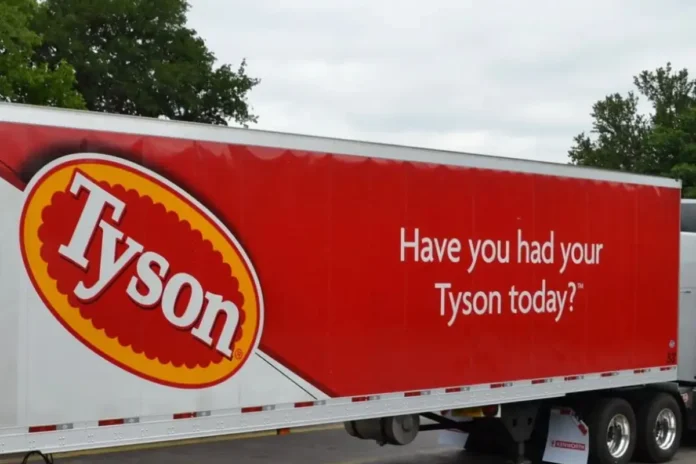Tyson Foods has promoted long-time executive Devin Cole to the role of Chief Operating Officer, placing him in charge of the company’s key business units at a moment of both opportunity and pressure for the US meat processor.
Cole will now oversee poultry, beef, pork, prepared foods and international. He will continue to report to Donnie King, the company’s president and chief executive.
The move comes just weeks before Tyson’s new financial year begins on 28 September and alongside the sudden departure of Brady Stewart, another senior leader whose exit has prompted questions inside the industry.
A company veteran steps up
Cole is not a new face. He has worked in the food industry for more than 30 years, much of it inside Tyson. Most recently, he held the role of Group President for Poultry and International, two divisions that have been under pressure but also critical to Tyson’s global growth.
Poultry has been a tough business in the past few years. Feed costs soared, demand was uneven, and plant closures hit production. Yet Cole managed to steer the unit to three consecutive quarters of volume growth. He also found ways to restore profitability overseas, cutting costs and putting new efficiency plans in place.
That track record appears to have tipped the balance in his favour. In a statement, King said Tyson was “entering the new fiscal year with momentum” and praised Cole’s operational focus.
“We remain committed to our long-term strategy and to running the company guided by our culture and Core Values,” King said. “I am confident that under Devin’s leadership our business will continue to thrive.”
The sudden departure of Brady Stewart
The announcement came with news that Brady Stewart had left the business with immediate effect. Tyson said certain actions taken by Stewart violated the company’s Code of Conduct but gave no detail beyond that.
His responsibilities have now been moved, at least temporarily, to CEO King. That means supply chain, food safety, health and safety, environmental and transport all sit directly under the chief executive for the moment.
For a company the size of Tyson, with more than 139,000 employees worldwide, it is a notable shift in reporting lines. It gives King direct oversight of functions that touch on food security, sustainability and logistics — areas that are increasingly central to the company’s reputation as well as its bottom line.
Industry backdrop
The leadership changes come at a complicated time for the meat sector.
Tyson remains one of the world’s biggest processors of chicken, beef and pork, supplying retailers such as Walmart, Kroger and Aldi, as well as foodservice customers across the US and abroad. But the business is under pressure from several sides.
-
Beef margins are tight because of reduced cattle supply in the US.
-
Poultry demand is more stable, but competition is strong, with rivals such as Pilgrim’s Pride and Sanderson Farms investing heavily in production.
-
International growth has been one of the brighter spots, particularly in Asia, where demand for chicken continues to rise.
Competitors are also making big moves. Brazil’s JBS has been expanding globally, pushing hard into prepared foods and alternative proteins. Cargill, another US-based giant, has been investing in digital traceability and sustainability, areas where retailers are demanding more from suppliers.
Against that backdrop, Cole’s job will not be easy. He will need to show he can keep Tyson competitive while also managing cost inflation, shifting consumer habits and pressure from customers on price.
Why it matters for retailers and foodservice
For retailers, Tyson’s leadership stability is important. Supermarket chains depend on consistent supply of chicken, beef and pork, and any disruption at Tyson can ripple quickly through the supply chain. Recent years have already seen tight beef supply and rising chicken prices hit retailers’ margins.
Foodservice operators — from national chains to school meal providers — also rely heavily on Tyson. Analysts say the company’s ability to deliver on efficiency and keep costs under control will be watched closely as operators face their own struggles with inflation and changing consumer demand.
Looking ahead
Tyson has said it will provide more detail on its leadership structure before the start of fiscal 2026 on 28 September. Observers expect those updates to include decisions on whether King keeps direct control of supply chain and food safety functions or delegates them to another executive.
The company has been reshaping itself over the past two years, shutting some plants and consolidating operations to cut costs. At the same time, it has been trying to expand in prepared foods and international markets, both seen as important for long-term growth.
Cole’s appointment signals continuity more than radical change. But it also marks a moment of transition, with one senior leader stepping down abruptly and another taking on the most wide-ranging role in the company.
For investors, retailers and competitors, the next few weeks could give clearer answers on how Tyson intends to manage that transition and whether Cole’s operational experience will be enough to guide the company through a challenging market.



